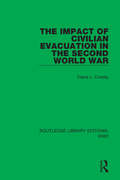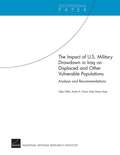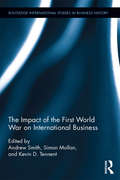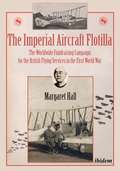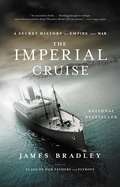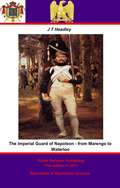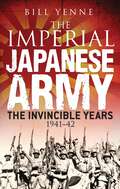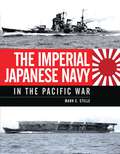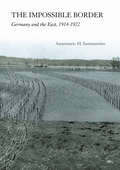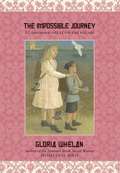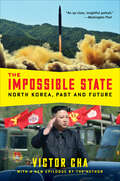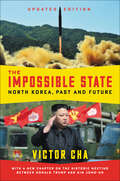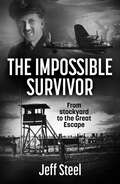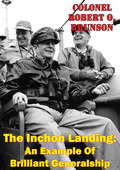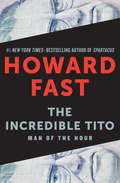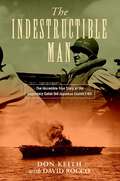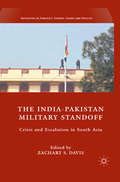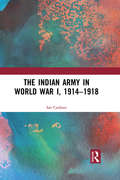- Table View
- List View
The Impact of Civilian Evacuation in the Second World War (Routledge Library Editions: WW2 #14)
by Travis L. CrosbyThis book, first published in 1986, examines the wartime evacuation of children in Britain from their homes in cities to safety in the countryside. It analyses the social impact of the separation on parents and children, and teases out of the official records the origins and assumptions of evacuation planning. It examines the aims, implementation and evolution of the evacuation policy, its success or failure and its effect upon post-war social planning in Britain.
The Impact of U.S. Military Drawdown in Iraq on Displaced and Other Vulnerable Populations
by Olga Oliker Dalia Dassa Kaye Audra K. GrantAs the United States continues to draw down its forces and prepares to end its military involvement in Iraq, the implications for Iraq's at-risk populations must be considered. Oliker, Grant, and Kaye assess the risks and implications of drawdown and withdrawal for some of the Iraqis in greatest danger, both within Iraq and in neighboring states. The authors conclude with recommendations on how the United States can mitigate identified problems.
The Impact of the First World War on International Business (Routledge International Studies in Business History)
by Andrew Smith Simon Mollan Kevin TennentPeople throughout the world are now commemorating the centenary of the start of the First World War. For historians of international business and finance, it is an opportunity to reflect on the impact of the war on global business activity. The world economy was highly integrated in the early twentieth century thanks to nearly a century of globalisation. In 1913, the economies of the countries that were about to go war seemed inextricably linked. The Impact of the First World War on International Business explores what happened to international business organisations when this integrated global economy was shattered by the outbreak of a major war. Studying how companies responded to the economic catastrophe of the First World War offers important lessons to policymakers and businesspeople in the present, concerning for instance the impact of great power politics on international business or the thesis that globalization reduces the likelihood of inter-state warfare. This is the first book to focus on the impact of the First World War on international business. It explores the experiences of firms in Britain, France, Germany, Japan, China, and the United States as well as those in neutral countries such as the Netherlands, Sweden, and Argentina, covering a wide range of industries including financial services, mining, manufacturing, foodstuffs, and shipping. Studying how firms responded to sudden and dramatic change in the geopolitical environment in 1914 offers lessons to the managers of today’s MNEs, since the world economy on the eve of the First World War has many striking parallels with the present. Aimed at researchers, academics and advanced students in the fields of Business History, International Management and Accounting History; this book goes beyond the extant literature on this topic namely due to the broad range of industries and countries covered. The Impact of the First World War on International Business covers a broad range of geographical areas and topics examining how private firms responded to government policy and have based their contributions mainly on primary sources created by business people.
The Impact of the Russo-Japanese War (Routledge Studies in the Modern History of Asia #10)
by Rotem KownerThe Russo-Japanese War was the major conflict of the earliest decade of the twentieth century. The struggle for mastery in northeast Asia, specifically for control of Korea, was watched at the time very closely by observers from many other countries keen to draw lessons about the conduct of war in the modern industrial age. The defeat of a traditional European power by a non-white, non-western nation became a model for imitation and admiration among people under, or threatened with, colonial rule. Examining the wide impact of the war and exploring the effect on the political balance in northeast Asia, this book focuses on the reactions in Europe, the United States, East Asia and the wider colonial world, considering the impact on different sections of society, on political and cultural ideas and ideologies, and on various national independence movements.
The Imperial Aircraft Flotilla: The Worldwide Fundraising Campaign for the British Flying Services in the First World War
by Margaret HallA great wave of fundraising patriotic associations followed in the wake of Great Britain's declaration of war on Germany on 4 August 1914, at home but also right across the empire. The most successful public campaign of all was launched in London at the beginning of 1915. Known as the Imperial Aircraft Flotilla, the scheme aimed to attract contributions towards aircraft production costs from throughout the British Empire. Any country, locality, or community that provided sufficient funds for an entire aeroplane could have it named after them. It was promised that when the machine crashed or was shot down, the name would be transferred to a new one of the same type.Margaret Hall examines the Imperial Aircraft Flotilla as a facet of imperial history. She analyzes the fundraising efforts in Canada and Newfoundland; the Zanzibar Protectorate; Fiji, Mauritius, and the Caribbean; Hong Kong; the Malay states and Straits Settlements; West Africa, especially Gold Coast; Southern Rhodesia; Basutoland; Swaziland and the Union of South Africa; the Indian empire and Burma; (British subjects in) independent Abyssinia and Siam; in the Shanghai International Settlement, and the British community of Argentina; Australia; and New Zealand. This remarkable and detailed book discusses the propaganda and counter-subversion usages of the Imperial Aircraft Flotilla—and what the support for the imperial war effort reveals about contemporary national and regional identities and aspirations.
The Imperial Cruise: A True Story of Empire and War
by James BradleyIn 1905 President Teddy Roosevelt dispatched Secretary of War William Howard Taft on the largest U.S. diplomatic mission in history to Hawaii, Japan, the Philippines, China, and Korea. Roosevelt's glamorous twenty-one-year-old daughter Alice served as mistress of the cruise, which included senators and congressmen. On this trip, Taft concluded secret agreements in Roosevelt's name. In 2005, a century later, James Bradley traveled in the wake of Roosevelt's mission and discovered what had transpired in Honolulu, Tokyo, Manila, Beijing and Seoul. In 1905, Roosevelt was bully-confident and made secret agreements that he though would secure America's westward push into the Pacific. Instead, he lit the long fuse on the Asian firecrackers that would singe America's hands for a century.
The Imperial German Army Between Kaiser and King: Monarchy, Nation-Building, and War, 1866-1918
by Gavin WiensThis book provides a reappraisal of Germany’s military between the mid-nineteenth century and the end of the First World War. At its core is the following question: how 'German' was the imperial German army? This army, which emerged from the Wars of Unification in 1871, has commonly been seen as the 'school of the nation'. After all – so this argument goes – tens of thousands of young men passed through its ranks each year, with conscripts undergoing an intense program of patriotic education and returning to civilian life as fervent German nationalists and ardent supporters of the German emperor, or Kaiser. This book reexamines this assumption. It does not deny that devotion to the Fatherland and loyalty to the Kaiser were widespread among German soldiers in the decades following unification. It nevertheless shows that the imperial German army was far less homogenous and far more faction-ridden than has hitherto been acknowledged.
The Imperial Guard of Napoleon - from Marengo to Waterloo
by Pickle Partners Publishing Joel Tyler HeadleyThis ebook is purpose built and is proof-read and re-type set from the original to provide an outstanding experience of reflowing text for an ebook reader. J. T. Headley was born at the very end of the convulsive period of the French revolution and Napoleonic Wars that followed, and wrote a number of volumes on the French army and its leadership of the period. This volume is a short and pithy, none the less entertaining, account of the structure, growth and battles of the famed Garde Impériale of Napoleon. Starting with the formation of the Guard from the early days in its form as the Consular Guard and their baptism of fire at Marengo. In the words of Napoleon - It was Granite Column: (Words of the First Consul in his report on the battle of Marengo to the government, 27 Prairial year VII.) Headley charts the growth of a corps of a few thousand men to an army within an army from 1812 onward until their final heroic stand at Waterloo to their disbandment by the Bourbon monarchy. Leaders such as Bessières and Drouot are picked out in detail, and famous events are described with panache. The volume leans heavily on Emile Marco St-Hilaire's Histoire anecdotique, politique et militaire de la Garde impériale Paris, Penaud, 1845-47, but is none the worst for it. A jaunty read. Text taken, whole and complete, from the 1851 edition published in New York by Charles Scribner. Original 310 pages. Author - Joel Tyler Headley (30/12/1813 - 30/12/1897)
The Imperial Japanese Army
by Bill YenneThe German blitzkrieg stunned the world in 1939-1940, and so too did the Japanese "blitzkrieg" of 1941-1942 in the Philippines, Indonesia, Malaya, and Burma. However, the remarkable Japanese land offensive involving operations of equivalent scope and complexity has received only a fraction of the attention. This is the story of that campaign.One of the few histories that tells the story of the Pacific War from the Japanese side, this is the long-awaited overview of the years when the Imperial Japanese Army (IJA) was conducting its seemingly unstoppable ground campaign in the Far East. It includes extensive background and biographical information on Japanese commanders, including Homma and Yamashita. In just eight weeks following December 7, 1941, the IJA pushed the Americans out of the Philippines, and defeated the British to captured Manila, Hong Kong, the Malay Peninsula, and the great bastion at Singapore--called the "Gibraltar of the East." They also forced the capitulation and occupation of Siam and the occupation of Burma. A month later, the Japanese had added the Netherlands East Indies, with an area and depth of natural resources more than twice that of Japan, to their trophy case. In The Imperial Japanese Army, author Bill Yenne recounts how the IJA faced and surmounted technical challenges that the Wehrmacht did not have--transportation. Whereas most of the German conquests were reachable by highways or rail lines, all of the IJA operations required ship transport, and most required amphibious landings. For example, in the Malay Peninsula campaign, the IJA famously used bicycles for the drive on Singapore.Unlike most histories of the Pacific War that focus on the Allied experience, The Imperial Japanese Army examines the year of victory from the Japanese perspective, when the mighty Japanese naval and ground forces swept all before them both throughout the Pacific and on mainland Asia.
The Imperial Japanese Navy in the Pacific War
by Mark StilleFrom the stunning victory at Pearl Harbor to its dramatic reversal at Midway, the Imperial Japanese Navy swept all before it in its numerous victories in the Pacific and Far Eastern waters. The Imperial Japanese Navy in the Pacific War pulls from many of Osprey's bestselling books on the subject in addition to the most recent research on the subject, including many sources from Japan, and is the most recent and accurate book on this fascinating force.Even after its setback at midway, the IJN remained a powerful force and inflicted sever setbacks on the US Navy at Guadalcanal and elsewhere. The Imperial Japanese Navy focuses on the Japanese ships which fought the battles in the Pacific including design details, where and when they were engaged and their ultimate effectiveness. In addition, the construction, design and service history of each ship from destroyer size on up is included. A comprehensive survey of the submarine force is also included. Modifications of each ship are covered making this a valuable reference source for Pacific War enthusiasts and historians, as well as ship modelers.A short history of the IJN during the Pacific War places all warship design and history in proper context. Finally, a chapter discussing the strengths and weaknesses of the IJN is included ultimately asking the question of whether the IJN really was a modern Navy which was fully prepared for the rigors of combat in the Pacific.
The Impossible Border: Germany and the East, 1914-1922
by Annemarie H. SammartinoBetween 1914 and 1922, millions of Europeans left their homes as a result of war, postwar settlements, and revolution. After 1918, the immense movement of people across Germany's eastern border posed a sharp challenge to the new Weimar Republic. Ethnic Germans flooded over the border from the new Polish state, Russian emigres poured into the German capital, and East European Jews sought protection in Germany from the upheaval in their homelands. Nor was the movement in one direction only: German Freikorps sought to found a soldiers' colony in Latvia, and a group of German socialists planned to settle in a Soviet factory town. In The Impossible Border, Annemarie H. Sammartino explores these waves of migration and their consequences for Germany. Migration became a flashpoint for such controversies as the relative importance of ethnic and cultural belonging, the interaction of nationalism and political ideologies, and whether or not Germany could serve as a place of refuge for those seeking asylum. Sammartino shows the significance of migration for understanding the difficulties confronting the Weimar Republic and the growing appeal of political extremism. Sammartino demonstrates that the moderation of the state in confronting migration was not merely by default, but also by design. However, the ability of a republican nation-state to control its borders became a barometer for its overall success or failure. Meanwhile, debates about migration were a forum for political extremists to develop increasingly radical understandings of the relationship between the state, its citizens, and its frontiers. The widespread conviction that the democratic republic could not control its "impossible" Eastern borders fostered the ideologies of those on the radical right who sought to resolve the issue by force and for all time.
The Impossible Journey
by Gloria WhelanOne Russian night in 1934, Marya and Georgi's parents disappear. Despite high risks, Katya and Misha had spoken against the government. The children, alone and desperate, fear the worst. Will they ever see their parents again? But all it takes is one crumpled letter to give Marya and Georgi hope and send them on a dangerous mission to reunite their family. They must steal away in the dark of night, escape the city, and find passage to the great Siberian wilderness. And even then, if they succeed in getting away, their journey will have only just begun. In this companion novel to her breathtaking Russian epic Angel on the Square, National Book Award winning author Gloria Whelan takes readers on a remarkable journey that is both perilous and transforming.
The Impossible Knife of Memory
by Laurie Halse Anderson<P>For the past five years, Hayley Kincaid and her father, Andy, have been on the road, never staying long in one place as he struggles to escape the demons that have tortured him since his return from Iraq. <P>Now they are back in the town where he grew up so Hayley can attend school. <P>Perhaps, for the first time, Hayley can have a normal life, put aside her own painful memories, even have a relationship with Finn, the hot guy who obviously likes her but is hiding secrets of his own. <P>Will being back home help Andy's PTSD, or will his terrible memories drag him to the edge of hell, and drugs push him over?
The Impossible State: North Korea, Past and Future
by Victor ChaFrom a seasoned advisor, &“a meaty, fast-paced portrait of North Korean society, economy, politics and foreign policy&” (Foreign Affairs). In The Impossible State, international-policy expert and former Director for Asian Affairs at the National Security Council Victor Cha pulls back the curtain on this controversial and isolated country, providing the best look yet at North Korea&’s history, the rise of the Kim family dynasty, and the obsessive personality cult that empowers them. He illuminates the repressive regime's complex economy and culture, its appalling record of human-rights abuses, and its belligerent relationship with the United States, and analyzes the regime&’s major security issues—from the seemingly endless war with its southern neighbor to its frightening nuclear ambitions—all in light of the destabilizing effects of Kim Jong-il's death and the pivotal and disquieting transition of power from tyrannical father to inexperienced son. How this enigmatic nation-state—one that regularly violates its own citizens&’ inalienable rights and has suffered famine, global economic sanctions, a collapsed economy, and near total isolation from the rest of the world—has continued to survive has long been a question that preoccupies the West. Cha reveals a land of contradictions, and delves into the ideology that leads an oppressed, starving populace to cling so fiercely to its failed leadership. With rare personal anecdotes from the author&’s time in Pyongyang and his tenure as an adviser in the White House, this authoritative, accessible, &“engrossing&” history (The Economist) offers much-needed understanding of the country&’s veiled past and uncertain future. &“An up-close, insightful portrait.&” —The Washington Post &“An eye-opening view of the closed, repressive dictatorship of North Korea. . . . A useful, pertinent work for understanding the human story behind the headlines.&” —Kirkus Reviews
The Impossible State: North Korea, Past and Future
by Victor ChaIn The Impossible State, seasoned international-policy expert and lauded scholar Victor Cha pulls back the curtain on provocative, isolationist North Korea, providing our best look yet at its history and the rise of the Kim family dynasty and the obsessive personality cult that empowers them. Cha illuminates the repressive regime’s complex economy and culture, its appalling record of human rights abuses, and its belligerent relationship with the United States, and analyzes the regime’s major security issues—from the seemingly endless war with its southern neighbor to its frightening nuclear ambitions—all in light of the destabilizing effects of Kim Jong-il’s death and the transition of power to his unpredictable heir.Ultimately, this engagingly written, authoritative, and highly accessible history warns of a regime that might be closer to its end than many might think—a political collapse for which America and its allies may be woefully unprepared.
The Impossible Survivor: From stockyard to the Great Escape
by Jeff SteelNothing can prepare a man for the horrors of war, nor the haunting memories that linger long after the battle is over. In The Impossible Survivor, Jeff Steel invites readers into the life of Neil Lindsay, a retired RAF Bomber Command veteran, as he confronts the shadows of his past. On a seemingly ordinary day in 1995, Neil and his daughter Margaret visit a memorial honouring the fallen soldiers of the Goulburn Valley. What begins as a simple outing soon unravels the buried truths of Neil&’s harrowing experiences during World War II. An ambitious young man, Neil's fate intertwined with the legendary figures of the RAF, including the celebrated Wing Commander Guy Gibson. He bravely flew perilous missions over Nazi Germany, becoming the sole survivor of a downed bomber and enduring two years of torment in a German prisoner-of-war camp. As he stands before the memorial stone he provides a glimpse into his past, sharing the first fragments of the extraordinary story that had been hidden for so long.The Impossible Survivor is a powerful tribute to those who fought bravely, capturing the essence of ordinary men faced with extraordinary circumstances. These men did not seek out the risk of death or the challenges of war; they volunteered out of a sense of duty and courage. They faced life-or-death situations with a blend of character, training, determination, and a touch of luck, fully aware of the slim chances of returning home. Neil Lindsay&’s story stands as a powerful testament to their extraordinary resolve.
The In & Out
by Tim NewarkThe Naval and Military Club--or the 'In & Out' as it is affectionately known--is one of Britain's greatest and oldest service clubs and this book tells its rich and entertaining history for the first time. Lavishly illustrated, it captures the essence of British style inside one of London's grandest clubhouses--first with a famous home in Piccadilly and now in St James's Square. Over 150 years, its members have included numerous Victoria Cross winners, triumphant generals and admirals, even bold explorers. There are intimate tales of brave soldiers and sailors--alongside a few rogues and accounts of scandalous behaviour!
The Inchon Landing: An Example Of Brilliant Generalship
by Colonel Robert O. BrunsonThe Inchon Landing’s success required a commander like General MacArthur who could gain the cooperation and coordination of the Army, Navy, Marine, and Air Force commanders, despite their belief that the Inchon Landing operation was very nearly impossible. Only these commanders, with their men, had the necessary experience in amphibious attacks under General MacArthur in the Pacific during World War II. The speed at which the forces were built up, the timely and accurate intelligence information gathered, and the brave and valiant execution of the plan by the soldiers, sailors, airmen, and marines who successfully fought not just the enemy forces but also the natural characteristics of the landing site with its tides, seawalls, mud flats and monsoons; changed the very nature of the Korean conflict. The landing at Inchon cut the North Korean lines of communication, allowed the breakout of the Pusan Perimeter, and totally routed Communist forces on the brink of apparent victory. The amphibious landing at Inchon on 15 September 1950, with its flanking movement using the indirect approach, is truly an example of brilliant generalship and military genius.
The Incredible Tito: Man of the Hour
by Howard FastFast&’s fascinating biography of Joseph Broz, known to the world as Tito, including his rise to power and his remarkable stand against fascismThe world was mired in the Second World War when Howard Fast wrote The Incredible Tito. Upon the book&’s publication in 1944, there was still no united Yugoslavia, the Axis controlled most of Europe, and D-Day was only in the planning stages. In the Balkans, Tito was a beacon of hope against the advancing Nazis. He led a force of resistance fighters that bedeviled the occupying German army throughout Slavic regions and empowered people&’s committees to act as local government in all liberated areas. For observers on the political left, Tito seemed uniquely poised to unite the East and West against fascism—once and for all. This ebook features an illustrated biography of Howard Fast including rare photos from the author&’s estate.
The Increment
by David IgnatiusFrom a hidden enclave in the maze of Tehran, an Iranian scientist who calls himself "Dr. Ali" sends an encrypted message to the CIA. It falls to Harry Pappas to decide if it's for real. Dr. Ali sends more secrets of the Iranian bomb program to the agency, then panics. He's being followed, but he doesn't know who's onto him, and neither does Pappas. The White House is no help -- they're looking for a pretext to attack Tehran. To get his agent out, Pappas turns to a secret British spy team known as "The Increment," whose operatives carry the modern version of the double-0 "license to kill." But the real story here is infinitely more complicated than he understands, and to get to the bottom of it, he must betray his own country. The Increment is The Spy Who Came In from the Cold set in Iran, with a dose of Graham Greene's The Human Factor to highlight the subtleties of betrayal.
The Increment: A Novel
by David IgnatiusThe New York Times bestseller: “A remarkably timely and pulse-quickening tale of deception, divided loyalty, and moral haziness.”—Raleigh News & Observer Harry Pappas, chief of the CIA’s Persia House, receives an encrypted message from a scientist in Tehran. But soon the source of secrets from the Iranian bomb program dries up: the scientist panics; he’s being followed, but he doesn’t know who’s on to him, and neither does Harry. To get his agent out, Harry turns to a secret British spy team known as “The Increment,” whose operatives carry the modern version of the double-O “license to kill.” But the real story is infinitely more complicated than Harry understands, and to get to the bottom of it he must betray his own country.
The Indestructible Man: The Incredible True Story of the Legendary Sailor the Japanese Couldn't Kill
by David Rocco Don KeithDixie Kiefer&’s reputation for durability began at the U.S. Naval Academy, where he broke an ankle and shattered a kneecap while playing football. After anti-submarine duty in World War I, he became a pioneer of naval aviation and had an elbow shattered by a plane that buzzed him as a joke. Kiefer&’s first World War II assignment was executive officer of the carrier Yorktown. He earned the Distinguished Service Medal at the Coral Sea and the Navy Cross at Midway, where—as his ship was sinking—he suffered severe burns to his hands and a compound fracture of his foot. After recuperating, Kiefer took command of the Ticonderoga. In January 1945, Japanese kamikazes struck the carrier, killing and wounding hundreds. Kiefer broke his arm and was struck by more than sixty pieces of shrapnel—but remained on the bridge for twelve hours, earning the Silver Star. Victim of ten wounds in two wars, veteran of some of the U.S. Navy&’s most celebrated carriers and battles, a naval aviation pioneer, Dixie Kiefer died in a stateside plane crash two months after the war ended.
The India-Pakistan Military Standoff
by Zachary S. DavisThis book focuses on the 2001-2002 crisis that brought India and Pakistan to the brink of war. Authors focus on: the political history that led to the crisis; the conventional military environment, the nuclear environment and coercive diplomacy and de-escalation during the crisis; and how South Asia can avoid similar crises in the future.
The Indian Army and the End of the Raj
by Daniel MarstonThe Partition of British India in 1947 resulted in the establishment of the independent states of India and Pakistan and the end of the British Raj. The decision to divide British India along religious lines led to widespread upheaval and communal violence in the period leading up to and following the official day of independence, 15 August 1947. In this book, Daniel Marston provides a unique examination of the role of the Indian army in post-World War II India. He draws upon extensive research into primary source documents and interviews with veterans of the events of 1947 to provide fresh insight into the vital part that the Indian Army played in preserving law and order in the region. This rigorous book fills a significant gap in the historiography of the British in India and will be invaluable to those studying the British Empire and South Asia more generally.
The Indian Army in World War I, 1914-1918
by Ian CardozoThis volume recounts India’s contribution to World War I. Please note: Taylor & Francis does not sell or distribute the Hardback in India, Pakistan, Nepal, Bhutan, Bangladesh and Sri Lanka
